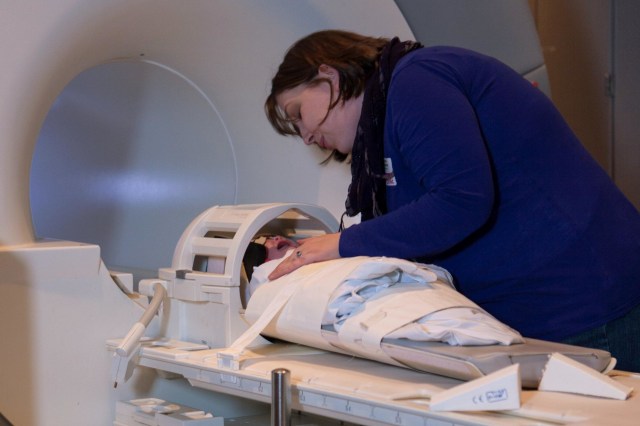 |
James Cheng / for NBC News/ Andrea Jackman comforts her 4-month-old daughter, Olivia, after her MRI scan at Seattle Children's Hospital.
|
A mysterious cluster of severe birth
defects in rural Washington state is confounding health experts, who
say they can find no cause, even as reports of new cases continue to
climb.
Federal and state
officials won’t say how many women in a three-county area near Yakima,
Wash., have had babies with anencephaly, a heart-breaking condition in
which they’re born missing parts of the brain or skull. And they admit
they haven't interviewed any of the women in question, or told the
mothers there's a potentially widespread problem.
But as of January 2013,
officials with the Washington state health department and the Centers
for Disease Control and Prevention had counted nearly two dozen cases in
three years, a rate four times the national average.
Since then, one local genetic counselor, Susie Ball of the Central Washington Genetics Program
at Yakima Valley Memorial Hospital, says she has reported “eight or
nine” additional cases of anencephaly and spina bifida, another birth
defect in which the neural tube, which forms the brain and spine, fails
to close properly.
“It does strike me as a lot,” says Ball.
And at least one Yakima mother whose baby is part of the cluster says no one told her there was a problem at all.
“I
had no idea,” said Andrea Jackman, 30, whose blue-eyed daughter,
Olivia, was born in September with the most severe form of spina bifida.
“I honestly was really surprised that nobody had said anything. If my
doctor hadn’t wanted us to see the geneticist, I wouldn’t have known.”
There’s no secret, state
and CDC officials said, and they noted that small clusters of birth
defects often turn out to be nothing more than sad coincidence.
The agencies released a report last summer detailing
an investigation of 27 women with pregnancies that resulted in neural
tube defects in Yakima, Franklin and Benton counties between 2010 and
2013. That included 23 cases of anencephaly,
a rate of 8.4 per 10,000 live births, far higher than the national rate
of 2.1 cases per 10,000. There were three cases of spina bifida and one
with encephalocele, a sac-like protrusion of the brain through the front or back of the skull.
They
publicly posted the results of the investigation in press releases and
on state and federal websites. Those were picked up in news stories,
including one in the local newspaper, the Yakima Herald-Republic. "State
says no cause found for birth defect in Yakima County," the July headline read.
But
it's not clear whether affected women saw those stories, and there was
no effort to reach out to individual families, said Mandy Stahre, the
CDC's Epidemic Intelligence Service Officer based in Washington state,
who led the inquiry. “There were very few of us that could spend time
doing this investigation,” Stahre said. “I’m not sure the women knew
they were part of a cluster.”
Health
officials originally were alerted to the problem by a nurse, Sara
Barron, 58, who was in charge of infection control and quality assurance
at Prosser Memorial Hospital, a 25-bed medical center in the farm town
set on the Yakima River. A 30-year nursing veteran, she’d seen perhaps
one or two devastating cases of anencephaly in her wide-ranging career.
“And
now I was sitting at Prosser, with 30 deliveries a month and there’s
two cases in a six-month period,” Barron said. “Then, I was talking to
another doctor about it and she has a third one coming. My teeth
dropped. It was like, ‘Oh my god.’”
At
a regional medical meeting, there were more anecdotal reports. So
Barron notified state health officials, who started looking into the
problem.
“This is bizarre,” Barron said. “This is a very, very small area.”
More at NBC News.com >>
No hay comentarios:
Publicar un comentario